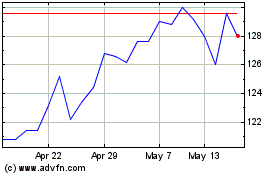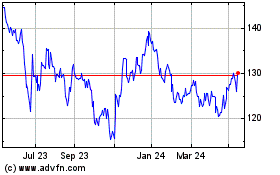A breakdown of corporate operating costs paid is provided
below:
Year to Year to
31 Dec 2014 31 Dec 2013
Corporate Expenses GBP million GBP million
Management fees (11.1) (10.6)
=========================== ============= =============
Audit fees (0.1) (0.1)
=========================== ============= =============
Directors fees (0.2) (0.2)
=========================== ============= =============
Other running costs (0.8) (0.8)
=========================== ============= =============
Operating costs (ongoing) (12.2) (11.7)
=========================== ============= =============
The increase in management fees paid to the Investment Adviser
is in line with the growth in managed investments and the growth of
the Company's portfolio.
Year to Year to
31 Dec 2014 31 Dec 2013
Ongoing Charges GBP million GBP million
Annualised Ongoing Charges(1) (12.2) (11.7)
=============================== ============= =============
Average NAV(2) 983.5 905.9
=============================== ============= =============
Ongoing Charges (1.24%) (1.29%)
=============================== ============= =============
(1) The Ongoing Charges ratio was prepared in accordance with
the Association of Investment Companies' ('AIC') recommended
methodology, noting this excludes non-recurring costs.
(2) Average of published NAVs for the relevant period
Performance against Strategic Priorities - Active Asset Management
Investment cash flow from the Company's portfolio of 112
investments has continued to perform at least in line with the
Company's forecasts. Ensuring that the Company's assets are
available for use and are performing in accordance with contractual
expectations is a critical task for the Company and its service
providers.
The Investment Adviser, on behalf of the Company, closely
monitors the relationship between service providers and public
sector clients. It is actively involved in the ongoing management
of assets to ensure that performance standards are being met. In
addition to these day-to-day activities, the Investment Adviser
works with public sector clients on assignments as they arise. For
example, during 2014, the Investment Adviser worked with a number
of schools in the Company's portfolio who wished to convert to
'Academy' status. In assuming Academy status the schools are given
more control over their own finances as they receive funding
directly from the 'Education Funding Agency' (a government
department) rather than via their local authority. The Investment
Adviser has assisted these schools navigate a complex set of
processes between the school and the various providers who are
party to the underlying PFI contract to help ensure that they are
not disadvantaged by the change in status. To date the Investment
Adviser has assisted ten schools through the transition to Academy
status.
The Company also takes an active role in assisting its public
sector clients to achieve savings from existing concession
arrangements. As a signatory to the Code of Conduct for Operational
PFI/PPP Contracts the Investment Adviser has worked with its public
sector counterparties to identify and deliver efficiencies and
savings in operational PFI and PPP contracts. Across the portfolio
a number of benchmarking exercises have been undertaken that has
resulted in reduced costs to the public sector. In addition, other
projects within the portfolio have seen benchmark reports submitted
or the benchmarking process commenced. As part of this initiative
the Investment Adviser has focused on opportunities to reduce
energy consumption within the projects including the installation
of LED lighting and motion sensors to help reduce energy spend over
time. The Investment Adviser is also currently assisting one of its
public sector clients assess the benefits of installing a large
solar rooftop array on its buildings in order to reduce energy
charges over the longer term.
During 2014 our public sector clients commissioned c.900
variations resulting in over GBP34 million of additional works at
the project level. All variations were overseen by the Investment
Adviser as part of the day-to-day asset management activities it
undertakes in conjunction with the project facilities manager and
the public sector client. Variations ranged in size from a few
hundred pounds to over GBP17 million and demonstrate the value and
flexibility of PFI/PPP contracts to respond to the changing
requirements of public sector clients.
A number of key construction milestones were also reached on
portfolio projects during the period: Stage 2 of the Royal
Children's Hospital reached completion in late 2014 some three
months in advance of the contractual completion date; the Federal
Ministry of Education and Research, Berlin reached construction
completion on time and budget at the beginning of August 2014; and,
the Gold Coast Rapid Transit also reached completion in July
2014.
Projects under construction as at 31 December 2014, all of which
are currently on schedule for operational commencement are set out
in the table below.
Defects % of Fair
Construction Completion Completion Value
Asset Location Date Year Status of Investment
Building Schools
for the Future portfolio UK August 2015 2016 On schedule 0.1%
=========================== ========== ========================= ============= ============= ===============
Federal Ministry of Education and Research in Berlin (BMBF)
Project summary
The EUR120 million BMBF project involved the design,
construction, operation and financing of the new headquarters of
the Federal Ministry of Education and Research in Berlin ('the
Ministry') and comprised two connected buildings on a c.13,400 sqm
piece of land owned by the German Government Agency for Real Estate
('the Authority'). The new building has a gross area of c.55,000
sqm and provides space for around 1,000 employees.
The Ministry provides funding for research projects and
institutions and sets general educational policy in Germany,
including providing student loans. The project was the first civil
construction project developed under a PPP model by the Federal
German Government and is a pioneering project for the German PPP
market. It was awarded Project Finance 'Deal of the Year' in
2011.
The Investment Adviser was involved in the project since its
inception and in conjunction with its consortium partners was the
successful bidder in the Authority's procurement process.
Construction on the project commenced on 1 August 2011 and was
effectively delivered through a turnkey contract with BAM
Deutschland AG as scheduled and to budget on 1 August 2014. Since
then the project has been operated in conjunction with the
facilities management ('FM') partner BAM
Immobilien-Dienstleistungen GmbH with the Investment Manager
engaged to provide ongoing asset management ('AM') services to the
project until July 2041.
In January 2015, following the completion of construction (and
consequent reduction in the project's risk profile), the Company
acquired a 98% equity interest and 100% of subordinated debt from
an associate of the Investment Adviser.
Project highlights - 'Green credentials'
The Ministry used the development of BMBF as an opportunity to
showcase research and development in sustainable practice and one
of the main characteristics of the new building is its 'green
footprint' focusing on green energy and energy efficiency. The
building achieved Gold Status under the Valuation System for
Sustainable Construction of Ministries in Germany which represents
the highest possible evaluation for sustainability. Key features
include:
> 'Smart Grid' technology, an intelligent heating and cooling
system which provides the most efficient air circulation and
optimal working conditions while removing the need for heating
radiators and air conditioning ventilators;
> The roof and building façade incorporate solar panels and
the building also contains a fuel cell and a combined heat/power
unit to supply the electrical and thermal power. The fuel cell is
the first to be used in a German public office building;
> The materials used during construction include natural
stone and recycled glass elements as well as sustainable wooden
window frames.
Structuring the project to minimising risks
The structure of the project is designed to minimise risks and
includes the following features:
> Availability based revenue stream - a standard availability
payment mechanism is supported by the Federal Republic of
Germany
> Limited construction risk - all construction milestones
were achieved within schedule and on budget
> Limited FM/lifecycle risk - all key operational risks,
including lifecycle and hard/soft FM are passed through to the FM
partner
> No refinancing or interest rate risk - project debt is
matched to the project life and hedging is in place
> Strong yield contribution - the project has been operational since August 2014
> Long project life - 27 year contract following practical completion in August 2014
Key asset management activities
International Public Par... (LSE:INPP)
Historical Stock Chart
From Jun 2024 to Jul 2024

International Public Par... (LSE:INPP)
Historical Stock Chart
From Jul 2023 to Jul 2024
